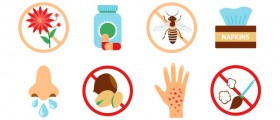
Usually, adverse reactions occur due to side effects of the medication, and not as a result of an adverse reaction in the immune system. The two types of reaction are often confused, as a result of shared symptomatic signs. If either kind of reaction occurs, it is advisable to consult a doctor of medical practitioner as soon as possible, as in some cases, reactions of both types can be severe.
Drug allergies
There are numerous types of drugs that can lead to the onset of an allergic reaction. This includes both prescription and over the counter medications. There are also numerous factors that can lead to an increased risk of exposure to drug allergy in a given individual. For example, if one has had a history of allergic reaction to drugs, then one might be more vulnerable to drug allergy in the future. Past allergic reactions will serve to increase the risk of more severe reactions occurring in the future. If you suffer from an underlying health condition that weakens your immune system, you will also be more prone to adverse reactions to medication. Hay fever and other allergies will also make you more vulnerable to the occurrence of an allergic reaction to medication. With regard to non allergic reactions, risk factors include multiple drug use, extremes of age, inherited vulnerability to toxins, and the presence of a potentially harmful underlying disease that can lead to an altering of your body’s absorption processes.
What to do in case of an allergy?
Make sure to schedule an appointment with a doctor, should you begin to experience side effects of medication or drugs. In the doctor’s office, remember to provide the doctor with as much relevant information as possible. This will assist in the diagnosis of the condition. Doctors will need to know whether or not you have suffered from a past history of drug allergy or reaction, and might even schedule a physical examination or a blood test. Skin tests and drug provocation tests might also be used in the process of diagnosing a drug allergy.

















Your thoughts on this
Loading...